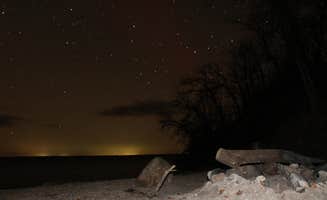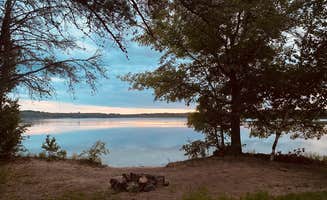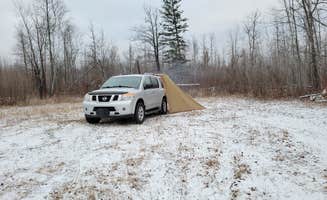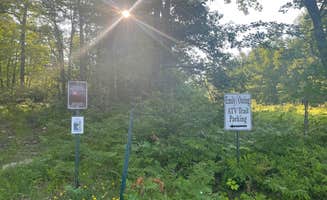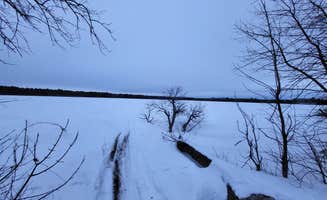Rustic camping near Deer River, Minnesota centers around the numerous National Forest and State Forest sites that provide secluded wilderness access. The region sits at approximately 1,300 feet elevation with sandy, glacial terrain that contributes to variable road conditions throughout camping areas. The Mississippi River and connecting lakes create a complex watershed with fluctuating water levels that impact shoreline campsites seasonally.
What to do
Paddle the water trails: The Mississippi Headwaters Water Trail offers designated paddling routes with specialized campsites accessible only by water. At Birches Landing on Lake Winni, one camper noted it serves as "a stop at the Mississippi Headwaters Water Trail... At times, the winds and storms on Lake Winnie are very dangerous, and paddlers are not able to get further up the point."
Explore forest hiking trails: The North Country Trail passes through several camping areas, offering well-maintained hiking routes. At Shingobee Recreation Area, a visitor explained, "Because it's on the NCT, the trail that passes the camp is extremely well maintained and groomed, not to mention super wide! If you have little ones that you are trying to 'wean' into camping, this would be a great place."
Winter recreation: Many dispersed sites remain accessible during colder months, particularly for cross-country skiing and snowshoeing. One reviewer at Shingobee Recreation Area observed, "My husband said it would be a great winter camping site, as it's more sheltered in the trees than some sites are. Plus in the winter, this trail is groomed for Cross Country Skiing."
What campers like
Lakefront positioning: Many dispersed sites allow direct lake access or views. At Mabel Lake State Dispersed, a camper shared, "This is a free dispersed camping site in the state forest with lake access. Large enough for multiple campers or a small group. There are four rings and a picnic table as well as a sandy boat launch."
Spacious sites: Several locations accommodate larger groups or multiple camping units. According to a Mabel Lake visitor, "I'd say there's comfortly room for eight campers or a small group." The campground provides ample space for spreading out equipment and setting up multiple tents.
Wildlife viewing: The forest environment supports diverse wildlife encounters throughout the day. Early risers at Mabel Lake noted, "It was so quiet last night, although the beaked neighbors get pretty chatty early." Beaver activity remains common in the smaller lakes and ponds throughout the region.
What you should know
Road conditions: Forest roads leading to dispersed sites vary greatly in quality and accessibility. At D57 Upper Pigeon Lake, a reviewer cautioned, "The road off of county Rd 33 (Dixon lake Rd) is short but unmaintained and the end of it has a good bit of uneven, sandy slope. I would not recommend it if you have low clearance or are not confident in maneuvering your vehicle/trailer."
Seasonal closures: Some sites become inaccessible during spring thaw or after heavy rainfall. Access roads may become impassable due to mud or standing water, particularly in low-lying areas near lakes.
Limited amenities: Most dispersed camping locations provide minimal facilities. At Hill River State Forest, a camper stated, "There were a good amount of spots, and I seemed to be the only person. Was a good and secluded... It is your average dispersed site." Another reviewer simply concluded, "Good luck. No amenities."
Tips for camping with families
Choose sites with established facilities: Locations with picnic tables and clearly defined tent pads provide easier setup for families. One visitor to Shingobee Recreation Area shared, "The tent pad is pretty level and all the pine needles soften the ground below the tent a bit. A plethora of trees give hammock-ers lots of options!"
Consider overflow space requirements: When camping with multiple family members, look for sites that accommodate additional tents. As noted at Shingobee, "Across the trail is a small little meadow type area that would be a perfect spot for 'overflow' tents, if you have more in your group than the site can take."
Pack extra bug protection: Mosquitoes remain prevalent, especially in early summer. Campers frequently mention insect pressure around standing water. Bring sufficient repellent and consider head nets for children during peak season.
Tips from RVers
Check road width before committing: Forest roads often narrow significantly after turning off main routes. At Camp Cassaway Dispersed, winter campers found "The snow was packed down enough to drive on even with a two wheel drive vehicle," but conditions vary by season.
Leveling challenges: Many dispersed sites feature uneven ground that requires additional effort to level recreational vehicles. Bring leveling blocks and assess the site before fully committing to a parking position.
Cell service variability: Connectivity fluctuates throughout the region. At Mabel Lake State Dispersed, a camper reported, "ATT is usable enough that I probably won't try Starlink, but there may be enough clear sky." Service tends to be stronger at higher elevations and more limited in valleys.


